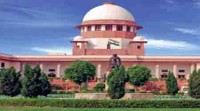The Supreme Court has to decide on the question whether deity of a temple who is legally accepted as minor can have title over the land which is attached to the temple. The other question is whether such land can be cultivated by ‘sevaits’ known as pujari or guardian under his behalf. From the ancient time, the land under the Hindu temples belonged to the deity who is recognized by the courts as legal entity. The Court also pointed out that in Ayodhya Ramjanambhoomi dispute case the High Court of Allahabad had accepted the right over Ram Lalla regardless of the ownership of deity over some portion of the land.
Later the High Court of Rajasthan had opined that the deities are minors and are not entitled to cultivate land. The Court also said that the land of temple should be vested with the concerned State Government. The order of the High Court adversely affected the pujaris who were taking care of the temples from ancient period. After the decision of the High Court the land belonging to each temple will vest with the Government of Rajasthan. As a result the Government published an advertisement stating the details for auction of temple land. The submission of the petitioner was that the said order affected many temples in rural areas as well as in the villages.
The appellant Mahant Damodar Das is the deity of Shri Thakurji of Sardarshan temple who challenged the judgment of the High Court on the ground that the decision is infringing right to religion guaranteed as a fundamental right. The bench consisted of Justice Dipak Misra and Justice P C Pant. The Court issued notice to Government of Rajasthan asking its reply in this issue. Now it is for the Court to decide whether the pujaris have the right to cultivate on the land belonging to the temple. After hearing the Supreme Court will reach a meaningful decision considering the precedents and law on the point.
Adv. Jewel Panicker







